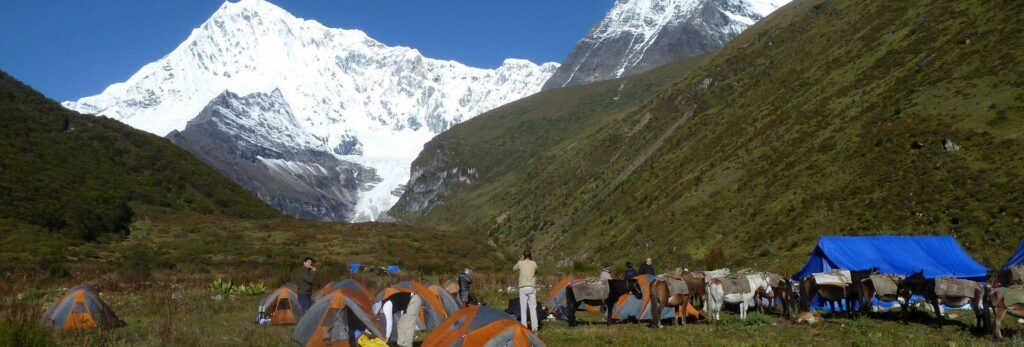
Laya Village

Laya village, situated at an elevation of 3,800m above sea level on the lap of the Masagang (7,100m) prevailed with their own their own dialect, customs and distinct dress from centuries were semi-nomadic yak herders Layaps called their home (be-yul, the hidden land) where Shabdrung Ngawang Namgyal first entered Bhutan. It is an amazing fact how a small pocket of ethnic group survived for so long in the north of this small country. When hiking for a snow Leopard trek or the grand Snowman Trek one can cover through the life of Layaps. To experience the maximum cultural richness, one can spent time during their Owlay festival that takes place once every after three years.
1. Altitude and Location:
- Elevation: Laya Village is situated at an altitude of approximately 3,800 meters (12,500 feet) above sea level. This high elevation gives it a cold alpine climate and breathtaking views of the surrounding Himalayan peaks.
- Location: The village is nestled in the northern part of Bhutan, close to the Tibetan border. It is located in the Gasa District, which is known for its rugged terrain and remote landscapes.
2. Scenic Beauty:
- Natural Landscapes: Laya Village is surrounded by stunning mountain scenery, including snow-capped peaks, lush green meadows, and fast-flowing rivers. The area offers panoramic views of some of Bhutan’s most spectacular mountain ranges.
- Climate: The village experiences a cold climate with heavy snowfall in winter and mild summers. The weather is typical of high-altitude regions, with temperatures dropping significantly during the colder months.
3. Cultural Significance:
- Traditional Lifestyle: The inhabitants of Laya Village are primarily known as the Layaps, an ethnic group with a distinct culture and traditional practices. The Layaps are traditionally yak herders and farmers, and their lifestyle is adapted to the harsh high-altitude environment.
- Dress and Customs: The Layaps are known for their unique traditional dress, which includes distinctive woolen garments and hats. Their culture includes traditional festivals, ceremonies, and customs that reflect Bhutan’s rich heritage.
4. Accessibility and Trekking:
- Trekking Routes: Laya Village is accessible via trekking, with popular routes including the Laya-Gasa Trek and the Laya-Dobjokha Trek. These treks are renowned for their challenging terrain, high-altitude passes, and the opportunity to experience Bhutan’s remote wilderness.
- Difficulty: The trek to Laya involves navigating rugged trails, high mountain passes, and variable weather conditions. It is recommended for experienced trekkers who are prepared for high-altitude trekking.
5. Flora and Fauna:
- Wildlife: The region around Laya Village is rich in wildlife. Trekkers may encounter animals such as the snow leopard, blue sheep, and various high-altitude bird species. The flora includes alpine plants and hardy shrubs that thrive in the cold climate.
- Vegetation: The landscape is characterized by alpine meadows, forests of coniferous trees, and patches of rhododendrons.
6. Accommodation:
- Lodging: Accommodations in Laya Village are basic. Visitors typically stay in traditional guesthouses or campsites set up by trekking companies. The facilities are simple, reflecting the village’s remote location.
7. Travel Tips:
- Permits: Visiting Laya requires permits due to its remote location and proximity to the Tibetan border. These permits are arranged through licensed Bhutanese tour operators.
- Preparation: Trekkers should be well-prepared for high-altitude conditions, including proper gear, clothing for cold weather, and acclimatization strategies. It is essential to be physically fit and experienced in high-altitude trekking.
8. Cultural Etiquette:
- Respect Local Traditions: When visiting Laya Village, it is important to respect local customs and traditions. Engage with the community in a respectful manner and follow local guidelines, especially when participating in cultural events or visiting religious sites.
Related
- Gasa Dzong
- Gasa Tshachhu (Hot springs)
- Jigme Dorji National Park
- Laya Village
- Lunana village
- Nature trip
Need Assistance?
Call Us : +975-17351324
+975-17495729
Email Us : adbhutantours@gmail.com
Send your Queries
